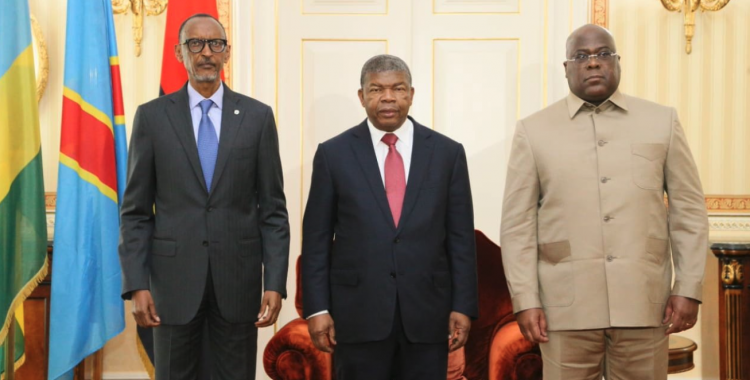The President of the Democratic Republic of Congo, Félix Tshisekedi, and his Rwandan counterpart, Paul Kagame, met in Luanda for a tripartite summit mediated by João Lourenço to discuss a solution to the armed conflict on the eastern border of DRCongo, whose responsibility the Congolese authorities attribute to Rwanda.
The three heads of state made short statements to journalists, without the right to ask questions, after the meeting, which lasted more than two hours, expressing satisfaction with the progress achieved and the "satisfactory" results of the meeting.
João Lourenço highlighted the "positive progress" that results in a ceasefire, among other measures included in the roadmap now approved, including the creation of an 'ad-hoc' observation mechanism, in addition to the one existing at the International Conference of the Greater Lagos which will be led by an Angolan general officer.
It was also decided to hold a meeting of the joint commission between the two countries, which has already taken place in Kigali and should also take place in Kinshasa, but which will take place on 12 July, in Luanda, "as a way of restoring the lost trust between the two countries".
The Angolan President also highlighted the "perfect understanding" between the heads of state which led to these results.
The President of Rwanda, Paul Kagame, also expressed his satisfaction, thanking João Lourenço for the "tireless" efforts in search of peace in the region and "between the two sister countries", as well as his Congolese counterpart for his contributions to "move forward ".
The Rwandan head of state stressed that both seek the normalization of relations between the two countries and want to resolve "the underlying issues" that "led to this point". "What we achieved was satisfactory and the best possible way to move forward", stated Kagame, considering that this was a good way to normalize relations.
The President of DRCongo, with a stronger emphasis on his statement, also thanked João Lourenço for the efforts in seeking a peaceful solution to a situation "unfairly imposed on DRCongo".
Félix Tshisekedi highlighted that both sides "showed a clear intention to move forward and put an end to this crisis", also thanking Kagame for his availability, and underlined that it is necessary to restore trust between the two countries and the two peoples. Trust that "was interrupted, unfortunately, when everything was going well, in the path of normalization between the two countries".
The Congolese head of state stressed that, since he came to power, he wanted to send a strong signal not only to Rwanda, but to all the countries in the region, of his intention to have relations aimed above all at profitable exchanges for the countries and populations of region, "which is one of the richest in Africa", rather than focusing on "the pointless tensions that we have seen in the past".
"I am one of the people most affected by the current situation in the east of my country and, therefore, I will do everything in my power to advance the situation and remove my compatriots from this situation that has lasted for 20 years," he said. .
Tshisekedi said the tension had been exacerbated by "this unfortunate situation" for the M23. "I cannot understand that an armed group that was arguing with us in Nairobi, but in a totally inexplicable behavior, in which the interlocutor was available to hear the demands, could, again, take up arms to exert blackmail and pressure", he criticized.
The President of DRCongo added that, after the meeting, he expects an immediate ceasefire and the withdrawal of this M23 group, while the defined roadmap for peace, stability and confidence is set in motion.
In this sense, the mixed commission "which has not met for a long time" and which will meet in Luanda, taking into account the urgent context, should contribute with solutions.
"That's what we expect, in DRCongo. We don't want either crisis or war, this completely disturbs the development project we have for our country and for the region", he highlighted.
Relations between Rwanda and neighboring DRCongo have deteriorated since DRCongo received, in its eastern part, Rwandan Hutus accused of participating in the Tutsi genocide in 1994.
The current escalation of tension is due to the resurgence of the M23 group (March 23 Movement), an armed militia that in 2012 opposed the Congolese government and generated a violent conflict that forced the displacement of thousands of people in North Kivu province. At the end of the same year, the M23 took control of Goma, but withdrew after the Congolese government agreed to open negotiations.
The M23 was initially a Congolese militia formed by Tutsis from the DR Congo and allegedly supported by the governments of Rwanda and Uganda. On March 23, 2009, the militia signed a peace agreement with the Congolese government that culminated in the incorporation of its members into the DR Congo army.
Last March, DRCongo accused the Rwandan government of sending special forces soldiers to Congolese territory. Between May and June of this year, M23 attacks killed dozens of civilians. More than 170,000 people were displaced.
East African leaders agreed last month to create a regional force to try to end the conflict in North Kivu.







